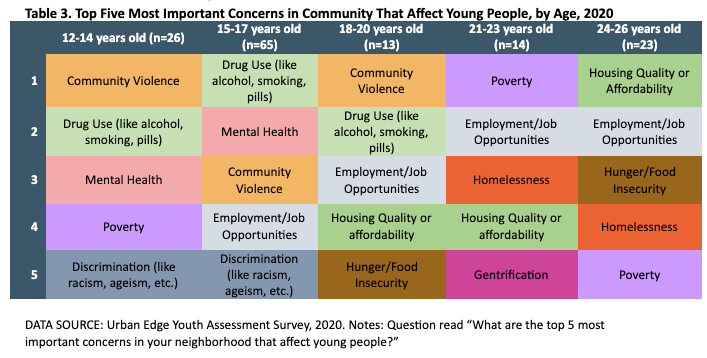Media Contact:
Suzanne Morse
(617) 646-1020
suzanne@sevenletter.com
Urban Edge Releases Analysis that Highlights Neighborhoods’ Opportunities and Concerns, Identifies Recommendations Re Youth Services
Boston, Mass. (August 10, 2021) – Urban Edge is releasing today a report highlighting the priorities and the vision for the future that youth living in Roxbury and Jamaica Plain have for their community. The “Community Assessment of Youth Programs, Services, and Opportunities,” which was conducted by Health Resources in Action, provides a snapshot of these neighborhoods’ demographics and highlights both concerns and opportunities for youth in the Jackson and Egleston Square communities.
More than 300 young residents of Roxbury and Jamaica Plain were engaged in the assessment process, through a variety of methods that included phone interviews, virtual focus groups, and an online community survey.
“This assessment has reinforced how culturally vibrant and diverse Roxbury and Jamaica Plain are, and the young people who live here are rightly proud of that fact,” said Emilio Dorcely, Urban Edge’s Chief Executive Officer. “But we also see the disparities within the community and the barriers that many of our young people face when it comes to economic opportunity.”
The assessment found that major areas of concern of residents were focused on financial security and economic opportunity – 63 percent of participants were looking for a new job and almost half (44%) were looking for higher pay while more than a quarter were looking for greater economic advancement. Worries about safety and community violence were also expressed by participants. An estimated quarter of respondents to the community survey said that concerns over safety prevented them from joining in programs around the neighborhood.

Additionally, access to mental health services was cited as an important need for the area’s youth. The young participants named limited options, the stigma attached to seeking services, and lack of support from the adults in their lives as barriers to treatment for anxiety, depression, and social isolation. The report quotes one parent as saying, “In more affluent communities getting support for your mental health is like a badge of honor. What are ways we can put the same effort and beauty around mental health in our own communities?”
“I love living in the Heath Street neighborhood because it’s a lively and diverse place for young people like me,” said Marcia Merida, a resident of Jackson Square. “But I also see that my friends and family members could use more support, such as making decisions about our future, jobs, school, and many other brilliant ideas they may have. I was honored to participate in this Youth Needs Assessment so that many more young people in Roxbury and Jamaica Plain like myself receive the services we all need. I am looking forward to seeing what comes next for our community.”
The report also included recommendations from respondents on ways to address the needs of the neighborhoods’ young people. Those recommendations included more coordination among the youth services already offered in Roxbury and Jamaica Plain, more support for capacity building, better employment and economic opportunities, and greater access to mental health supports.
The report goes on to say that Jamaica Plain and Roxbury have many social service assets that can be leveraged, but access to those services is a challenge for some residents. Youth services are still largely siloed and have limited capacity to collaborate or coordinate across organizations. More support is needed from longer-term funding streams, and a convener of groups.
“The young people living in Jamaica Plain and Roxbury represent the future of the City of Boston,” said Dorcely about the youth who live in the neighborhoods that are home to Boston’s Latin Quarter and an historically Black community. “As the community and stakeholders who care about the neighborhood make decisions about resources, they should listen to what
residents – particularly young people themselves – have to say. We believe this assessment will help in shaping the future of Roxbury and Jamaica Plain and the young people who have made it such an exciting and interesting place to live.”
//End
About Urban Edge
For 47 years, Urban Edge has offered a range of innovative programs that help low- and moderate-income families in and around Boston become economically resilient, establish homeownership, and access needed community resources. Throughout its history, the organization has developed nearly 1,500 units of affordable housing, making it one of Boston’s largest nonprofit developers of affordable housing. Most recently, the agency has been a prime mover in the redevelopment of the Jackson Square neighborhood, creating new affordable housing and commercial space along eight acres of land that border Roxbury and Jamaica Plain. For more information on Urban Edge, visit http://www.urbanedge.org.